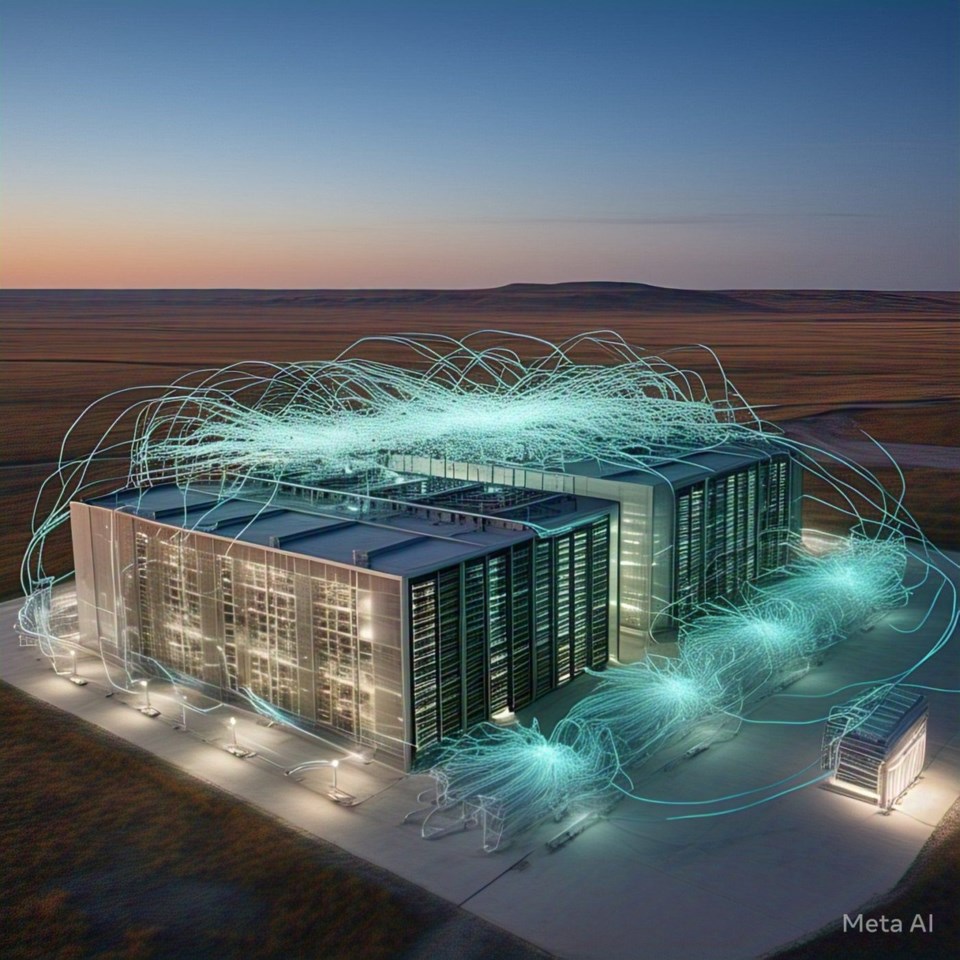Artificial intelligence and Alberta fit together like prairies and barley, the province has suggested in its push to make data centres a new frontier in economic development.
But as the province rolls out an AI data centre strategy, what do the real experts have to say?
You know: the AI masterminds themselves?
The consensus of three popular AI programs is that, yes, there’s plenty of Alberta potential to attract big bucks bent on satisfying the energy-thirsty brainiacs of our times.
To ride the AI data centre wave, however, small-town and rural Alberta must engage communities, generate public support and meet investor needs.
The Macleod Gazette sought comment from ChatGPT, Meta AI and Microsoft Copilot, using the query: “Is Alberta well-positioned for landing new artificial intelligence data centres?”
Each AI program was asked a follow-up: “Would the economic benefit of these centres extend to rural and small-town Alberta?”
Meta AI identified environmental concerns like demands on water. ChatGPT mentioned the need to involve Indigenous communities when proponents seek approvals for AI data centres.
AI was mostly rosy in its outlook, though. ChatGPT identified as positives a growing tech sector, cost competitiveness and access to natural resources, combined with the province’s “strategic location.”
The flagship creation of OpenAI, ChatGPT didn’t name a provincial AI strategy announced Dec. 4. Still, it noted that the government has “shown support for the tech industry, including initiatives to attract tech investments and foster innovation.”
It continued: “This supportive environment can encourage companies to choose Alberta for their data centre operations.”
Microsoft Copilot, meanwhile, jumped straight to Alberta’s AI Data Centre Strategy: Powering the Future of Artificial Intelligence. It highlighted the strategy’s three pillars of power capacity, sustainable cooling and economic growth.
Like the strategy itself, Copilot emphasized Alberta’s “abundant natural resources,” cold climate — great for cooling towers — and regulatory and economic advantages. Large plots of land and a “fibre-optic backbone” also make the province attractive.
Alberta is “well on its way to becoming a leading hub for AI data centres,” said Copilot.
Meta AI noted that the International Energy Agency forecasts growing global power needs. The agency estimates that the power required by data centres could double in the next 18 months, driven by increasing AI adoption.
Brought to you by the mega-company behind Facebook and Instagram, the app continued: “With its favourable business environment and energy infrastructure, Alberta is poised to capitalize on this growing demand.”
ChatGPT and Meta AI provided, umm, thoughtful responses to the rural question, with both fleshing out actual strategies.
The apps pointed to job creation as a direct benefit of saying yes in your backyard to an AI data centre, along with demand for local services and infrastructure development.
Rural Alberta could also expect indirect economic benefits like population retention, and the attraction of a tech ecosystem and renewable energy development.
But hold your wild horses, pardner. The benefits aren’t without challenges and mitigating factors, ChatGPT emphasized.
Rural areas may lack the skilled workforce needed to build and run data centres. “Investments in education and training programs, potentially in collaboration with local colleges, can help bridge this gap.”
Careful planning and negotiation are necessary to make sure data centres hire locally and use local businesses. Electricity demands can be onerous enough that, without new development, supply may be drained.
Communities and industry need to identify sites with adequate infrastructure near rural hubs. They should collaborate with each other and Indigenous groups to “ensure projects align with local priorities and deliver shared benefits,” ChatGPT said.
The province should consider tax incentives and grants to attract AI data centres to rural Alberta. “If Alberta aligns its policies and incentives with rural development goals, the arrival of AI data centres could provide a significant boost to smaller communities,” ChatGPT concluded.
Then it entertained a final follow-up: “What do you think of the opening two paragraphs we’ve written for this story about AI?”
“Your lede has a nice conversational tone and paints a vivid picture by tying Alberta’s identity to AI.”
Yes! Nailed It!
Oh, wait a minute.
“However, here's a suggestion to make it punchier and more engaging while maintaining journalistic flair. . .”
Nah. Ours is better.



